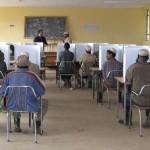IFPRI’s long-standing partnership with Canada has generated cutting-edge research in support of improved food security and nutrition, particularly for women and children, and gender equity, and IFPRI looks forward to continuing to work together to end hunger and malnutrition.
Highlights IFPRI and USAID partnership: Reducing poverty and hunger through food policy research
For four decades, the longstanding collaboration between the United States Agency for International Development (USAID) and the International Food Policy Research Institute (IFPRI) has been crucial to helping developing countries attain agriculture-led economic growth. The innovative programs and strong evidence base produced through this partnership have contributed to transforming policies and investments for improved food >> Read more
Championing Evidence- Based Regional Agricultural Policies and Mutual Accountability
In 2003, African countries came together with a common vision to accelerate Africa’s growth through agriculture- led development. Out of this vision, the African Union launched the Comprehensive Africa Agriculture Development Programme (CAADP)—a policy framework for agricultural transformation, wealth creation, food security and nutrition, economic growth, and prosperity for all of Africa by addressing key >> Read more
Contracting Out of Poverty
Access to markets is challenging for smallholders who may not be able to compete with larger operations that can provide firms with consistent quantities of high-quality products. This barrier to entry may be due to the smallholders’ limitations to exploit economies of scale, but it can also be due to their apprehension to sign contracts. IFPRI’s research project, Contracting Out Poverty: Experimental Approaches to Innovation in Agricultural Markets with Small Farmers, explored three innovative contract structures to solve this problem, focusing on markets for high-value crops in three diverse locations: Peru, Tanzania, and Viet Nam. Using randomized trials, innovative contract designs were developed with private companies in each country (a mango producer in Peru and milk processors in Viet Nam and Tanzania).
Strategies for Adapting to Climate Change in Rural Africa
The impact of climate change will be most severe in tropical countries, like many countries in Africa south of the Sahara—particularly in those that have scarce resources to channel into adaptation strategies, whose policy makers lack information, and where there is significant poverty. Even small climate changes can have a significant impact on farmers’ livelihoods and overall wellbeing. With support from the Federal Ministry for Economic Cooperation and Development (BMZ) and the CGIAR Research Program on Climate Change, Agriculture, and Food Security (CCAFS), IFPRI worked with the Association for Strengthening Agricultural Research in Eastern and Central Africa (ASARECA), the Food, Agriculture and Natural Resources Policy Analysis Network (FANRPAN), and other national partners to generate country-level analyses on climate change impacts and adaptation strategies for 10 countries in East Africa and 8 countries in southern Africa. IFPRI published the results in three books released in 2013: East African Agriculture and Climate Change: A Comprehensive Analysis, Southern African Agriculture and Climate Change: A Comprehensive Analysis, and West African Agriculture and Climate Change: A Comprehensive Analysis.
Strategic Investment Planning to Improve Growth and Reduce Poverty in Africa
In 2004, BMZ was one of the first organizations to partner with IFPRI in supporting the NEPAD Secretariat and the implementation of CAADP. BMZ’s partnership allowed IFPRI, between 2004 and 2007, to prepare a roadmap to guide the CAADP implementation process, establish the program’s credibility among development partners, and facilitate the adoption of the CAADP agenda by more than 20 African countries and by regional economic communities. From 2008 to 2011, IFPRI assisted the NEPAD Secretariat and regional economic communities in implementing and advocating for the CAADP agenda at the regional, sub-regional, and national levels. IFPRI also helped build the capacity of national teams and experts to lead the analytical work.
- 1
- 2
- 3
- …
- 6
- Next Page »




